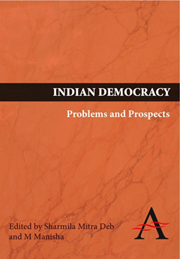Book contents
- Frontmatter
- Contents
- List of Contributors
- PREFACE
- Introduction DEMOCRATIC POLITICS IN INDIA: CONCEPTS, CHALLENGES AND DEBATES
- 1 RECONSTRUCTING DEMOCRATIC CONCERNS IN INDIA
- 2 ARE WE READY FOR DEMOCRACY? A FEW OBSERVATIONS
- 3 DEMOCRACY AND POVERTY IN INDIA
- 4 DEMOCRACY AND FEDERALISM IN INDIA: TWO EPISODES AND A SET OF QUESTIONS
- 5 INDIA'S COALITION FUTURE?
- 6 HOW DEMOCRATIC IS OUR PARLIAMENT? ELITE REPRESENTATION AND FUNCTIONAL EFFICIENCY OF LOK SABHA
- 7 DEMOCRACY'S JANUS FACE: A REVIEW OF ELECTIONS IN POST-INDEPENDENCE INDIA
- 8 THE NATURE OF THE OPPOSITION IN INDIA'S PARLIAMENTARY DEMOCRACY
- 9 RESTYLING DEMOCRACY? MAINSTREAM MEDIA AND PUBLIC SPACE VIS-À-VIS INDIAN TELEVISION
- 10 THE POOR WORKING WOMEN: THE ACHILLES HEEL OF INDIAN DEMOCRACY – A PROFILE OF THE MAIDSERVANT FROM THE BUSTEES OF KOLKATA
- 11 HOW IS DEMOCRACY IN SOUTH ASIA? A COMPARISON OF THE ELITE AND THE MASS ATTITUDES
4 - DEMOCRACY AND FEDERALISM IN INDIA: TWO EPISODES AND A SET OF QUESTIONS
Published online by Cambridge University Press: 05 March 2012
- Frontmatter
- Contents
- List of Contributors
- PREFACE
- Introduction DEMOCRATIC POLITICS IN INDIA: CONCEPTS, CHALLENGES AND DEBATES
- 1 RECONSTRUCTING DEMOCRATIC CONCERNS IN INDIA
- 2 ARE WE READY FOR DEMOCRACY? A FEW OBSERVATIONS
- 3 DEMOCRACY AND POVERTY IN INDIA
- 4 DEMOCRACY AND FEDERALISM IN INDIA: TWO EPISODES AND A SET OF QUESTIONS
- 5 INDIA'S COALITION FUTURE?
- 6 HOW DEMOCRATIC IS OUR PARLIAMENT? ELITE REPRESENTATION AND FUNCTIONAL EFFICIENCY OF LOK SABHA
- 7 DEMOCRACY'S JANUS FACE: A REVIEW OF ELECTIONS IN POST-INDEPENDENCE INDIA
- 8 THE NATURE OF THE OPPOSITION IN INDIA'S PARLIAMENTARY DEMOCRACY
- 9 RESTYLING DEMOCRACY? MAINSTREAM MEDIA AND PUBLIC SPACE VIS-À-VIS INDIAN TELEVISION
- 10 THE POOR WORKING WOMEN: THE ACHILLES HEEL OF INDIAN DEMOCRACY – A PROFILE OF THE MAIDSERVANT FROM THE BUSTEES OF KOLKATA
- 11 HOW IS DEMOCRACY IN SOUTH ASIA? A COMPARISON OF THE ELITE AND THE MASS ATTITUDES
Summary
Auditing the workings of democracy and federalism in India is conceptually both very interesting and very challenging. Issues at several levels of analysis need to be examined, from the legal constitutional level where forms of power sharing between the different tiers of government are of relevance, to the political sociological level where the relationship between cultural identity and administrative region is relevant, to the political theoretical level where the crucial relationship between ‘political compromise’ and the ‘public interest’ is of interest. This last level is ignored in the literature on federalism in India which, in large part, is mainly preoccupied with aspects of institutional design. It is, however, of considerable importance to the debates on democracy, particularly those concerned with political processes.
This paper attempts to connect, both tangentially and directly, with some of these questions of political process. When thinking about the working of democracy and federalism we need to ask, for example, whether political compromise promotes the public interest, as some may seek to argue that since it has at its very core an accommodative politics that attempts to forge deals with challengers, even if they are opposed to one's beliefs, does such compromise undermine the public interest as it dilutes one's goals through its strategy of adjustment with divergent beliefs – goals that give legitimacy to one's political agency? Or, looked at another way, is the public interest nothing more than an aggregation of specific interests at any particular time and not some transcendental ideal beckoning into the future?
- Type
- Chapter
- Information
- Indian DemocracyProblems and Prospects, pp. 39 - 50Publisher: Anthem PressPrint publication year: 2009

